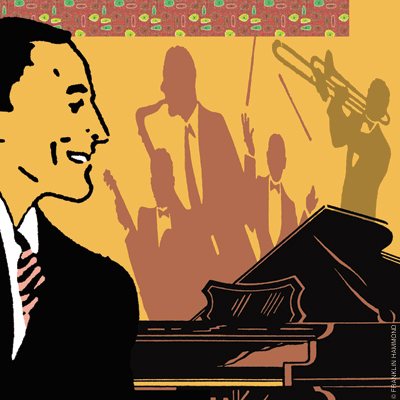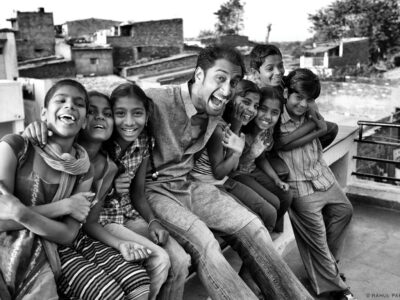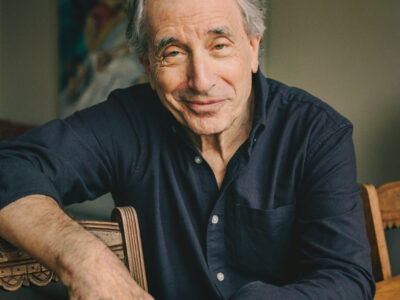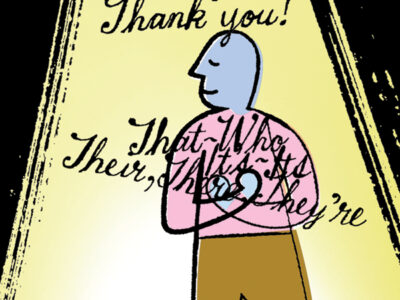
Class of ’44 | Elliot Lawrence C’44 was all of 12 years old when he formed his first big band, a 15-piece ensemble called the Band Busters. He was Elliot Lawrence Broza then, the son of WCAU radio executive Stan Lee Broza and singer Esther Broza Ed’23, and for the next four years he led the Band Busters on WCAU’s Children’s Hour.
“We were really good,” recalls Lawrence, who wrote the band’s arrangements. “We began to play on the Children’s Hour, and first thing you know we began to get these requests to play high-school dances all around Philadelphia.”
Lawrence, who had already survived a bout with polio when he was eight, won a scholarship to Penn in its music department. His father, who had seen his share of broke musicians, insisted that Elliot take all of his non-music courses in the Wharton School—where a finance professor quickly singled him out as an example.
“He would say to the class, ‘Look, you guys are all going to be business guys, lawyers, et cetera,’” Lawrence recalls. “‘This guy is going to be a musician. He has to control expenses better than you guys.’ I thought that was a great lesson to learn.”
At Penn he studied under composer/conductor Leon Barzin, pianist Erno Barlough, and Harl McDonald, head of the music department, director of the Choral Society and the Glee Club, and a serious composer and manager of the Philadelphia Orchestra. Lawrence and William Smith Mu’44 G’45, who later served as assistant conductor of the Philadelphia Orchestra under Eugene Ormandy, were McDonald’s star pupils.
“Harl McDonald said to me, ‘You should come to the Philadelphia Orchestra and I’ll make you the assistant conductor,’” Lawrence recalls. Smith eventually did just that, while Lawrence “went a different route.”
By his junior year at Penn, he had renamed his band the Elliot Broza Orchestra, and played numerous gigs at local colleges. He also received the University’s Art Achievement Award, an unusual honor for a musician. But, he adds: “What really changed my whole career path—and my whole life—was Penn Band,” then run by Adolph Vogel.
“I was the student conductor,” Lawrence explains. “But the war had started, and a lot of the music kids were gone. Penn had all of these ROTC groups—V5, V12, ASTP. Vogel threw up his hands and said, ‘I can’t get any players. You take over the band.’ I said, ‘Sure, but can the school get permission to get all of the players from the ROTC bands to play with the Penn Band?’ So he agreed, and all of these guys from the Army Band, the Navy Band, the Coast Guard Band who wanted to see the Penn football games joined. All of these cats who were in their 20s and really good came to play.”
For the biggest game of the year—the Penn-Army game—Franklin Field was packed: “50,000, 60,000 people,” in Lawrence’s recollection. “I decided, ‘What the hell, these guys have played these goddamn marches for so long, we’ll do something else.’ I would make a version for the band of all the Penn songs—but a swing version.
“So here we come, marching onto Franklin Field to a drum cadence, all the guys in different uniforms. They were required to wear the uniform of their own service. And a roar went up in the crowd. We stopped at the goal post, and went through a medley of five minutes of all the Penn tunes in a swing version. It was a big hit.”
When Leon Levy, the owner of WCAU Radio in Philadelphia, got wind of Lawrence’s triumph, he offered him the job of music director for the WCAU house band.
“So that was my start,” recounts Lawrence. “Instead of going into classical music [as] the assistant conductor of the Philadelphia Orchestra, I was going to have my band.”
Now called the Elliot Lawrence Orchestra (Lawrence didn’t want to be seen as cashing in on the Broza name at WCAU), the big band was among the first—along with those of Dizzy Gillespie, Woody Herman, and Claude Thornhill—to begin experimenting with the new music form, bebop. In addition to a number of original Band Busters, including vocalist Rosalind Patton, the band featured a number of young Philadelphians who became famous jazz masters in their own right: Gerry Mulligan, Red Rodney, Nick Travis, and Johnny Mandel, among others. Soon it was playing on the CBS radio network, recording for the Columbia and Fantasy labels, performing at big venues like the Paramount Theater in New York and the Palladium in Hollywood, and playing strings of one-nighters across the U.S. on national tours.
But Lawrence was born 10 years too late for the Big Band Era. The war and a disastrous recording strike by the American Federation of Musicians union undermined the economic foundations of the music business. Lawrence struggled to keep the band together through the early and mid-1950s, playing mostly weekend gigs. He also recorded “Elevation” and other numbers by Gerry Mulligan, Johnny Mandel, and Tiny Kahn, as well as some of his own compositions. But a combination of the new jazz economics and a heroin epidemic within the band spelled the end.
“Ollie Wilson, the great trombone player with Woody Herman, was in my band then,” recalls Lawrence, “and he came to me one night on the road and said, ‘El, I’m sorry to tell you this, but out of the 16 guys in the band, 14 of them are junkies.’ Only Ollie and I were clean.” Years later, Lawrence told Drew Techner, son of jazz trumpeter Joe Techner, that he had had “one of those love-hate relationships” with Gerry Mulligan, owing to disputes over publishing rights and the latter’s heroin addiction. Mulligan died in 1996.
Weary of the road (allergies were taking a serious toll on his health) and losing money on the band, Lawrence looked for work closer to home in New York. Fellow conductor and Ed Sullivan Show music director Ray Bloch had put together a talent agency to meet the demand for musicians. (In the 1950s, every radio and television show had at least a small musical group of its own, and the bigger shows had full orchestras.) Elliot soon signed on with Bloch’s agency, which led to a gig for the Jack Sterling Show on CBS Radio. He put together a band with jazz luminaries Tiny Kahn, Mary Osborne (one of the handful of women jazz artists), and Tyree Glenn (of the Ellington Orchestra).
The Ray Bloch agency also moved Lawrence into television: He conducted an orchestra on the Guide Right television show from February 1952 until the fall of 1953. During that time Elliot conducted a 13-piece band each week on the Red Buttons Show, using mostly CBS studio men, as well as his daily gig on the Jack Sterling radio show.
When The Ed Sullivan Show got the chance to be the first American TV show to broadcast from the Soviet Union, Bloch asked Lawrence to take his place. Lawrence, an all-Russian orchestra, and a star-studded American cast broadcast the show for U.S. and Soviet TV in front of audiences of thousands in Moscow and Leningrad. On the program were Marge and Gower Champion, a well-known dancing and theatrical couple.
“During the tour, Gower came to me and said, ‘You’ll do TV the rest of your life and no one will know who you are. Why don’t you come back with me and do my next show?’” recalls Lawrence. “That’s how I got the gig as music director for Bye Bye Birdie.”
That start led to a 16-year career as a Broadway conductor and music director. Nominated for a Tony Award in 1961 for his musical direction of Bye Bye Birdie, Lawrence was nominated again the following year for his work in How To Succeed in Business Without Really Trying. This time, he won. Five years later, he became the music director for the televised Tony Award ceremonies—and, at age 84, continues to do so.
“I’m working on it at this moment,” he said this past April. “I go to every show that’s on Broadway, and I try to put together ideas about what should be the numbers, what the Tonys should do, and where the musical numbers should go.”
In addition to his film credits—he was the composer/conductor for Network and scored the opening sequence for The French Connection—Lawrence has earned seven Emmy Awards, including for his musical direction of the Kennedy Center Honors. In October 2007, he and his son Jamie—also a composer and arranger—launched Composers Café, a series of programs showcasing prominent composers who present their work through stories, music, and video clips. The series is sponsored by the National Academy of Television Arts and Sciences.
“I’m still kicking, still going strong—and still cranky,” Lawrence says with a laugh. “I’m quite worried about the music business today. [In the past,] all my best musicians in New York could always do well in recording dates and recording songs, but that’s almost dried up now. If you don’t have a job in the [New York] Philharmonic, or the Philadelphia Orchestra, it’s a very tough life to be a musician. We’ve all read about how kids are sharing all the new music without buying new records. It’s disaster time for musicians. I don’t know how to change it.”
Though he sometimes wonders if he should have taken Harl McDonald’s advice and pursued the “serious side of music” represented by the Philadelphia Orchestra, Lawrence knows he’s had a remarkable career that spans many decades, musical styles, and media. “I’m very proud,” he admits.
—Charles Berg C’77 EE’77 and Samuel Hughes




